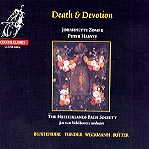The musical world in the decades just prior to the emergence of J.S. Bach was a thriving and beautiful place, and if you don’t believe it, just listen to the cantatas for solo voice and instruments on this outstanding disc from The Netherlands Bach Society and Channel Classics. Of course we know Dietrich Buxtehude primarily for his organ works and for his influence in the developing creative mind of a young Johann Sebastian, but his vocal music deserves far more attention, not only for historical investigation but for pure listening pleasure afforded by the concision and refinement of the scoring and for the attractive and expressive writing for the voice. Likewise, the relatively unknown Franz Tunder (father-in-law of Buxtehude) proves to be far more than just an interesting choice for this program–his music not only can stand head to head with any from this period, but in a work such as the soprano cantata Ach Herr, lass deine lieben Engelein (O lord, let Thy dear angels) we begin to think more in terms of “great” and “masterpiece”, such is the affecting power and beauty of the vocal writing and the effective changes of mood, rhythm, and tempo to address the textual meaning. Tunder’s settings of the chorale tune An Wasserflüssen Babylon (By the waters of Babylon) and of O jesu dulcissime, both for solo voice and strings (the former for soprano, the latter for bass) are further examples of his keen ear for tune and texture and for giving the glory to the vocal line (a more than casual nod to his familiarity with Italian styles).
And speaking of glory, both the performances and sound are deserving of the highest praise. I’ve had my reservations on other recordings concerning Johannette Zomer’s tendency to favor a kind of forced, colorless, piercing tone in certain music and at louder volume and in higher-register passages, but there’s almost–almost–no evidence of that “technique” here. She reveals a voice of considerable warmth and decent expressive range, and among her fine efforts she especially shines in the abovementioned Tunder cantata. Bass Peter Harvey always is worth hearing, and he’s an absolutely solid and commanding presence here, particularly effective in his dialogue with Zomer in Matthias Weckmann’s Wie liegt de Stadt so Wüste–another compelling work that deserves to be heard more often. The instrumental sound–violins, viola, gambas, cello, violone, bassoon, theorbo, organ–and the individual and collective performances are exemplary. The music is essential for fans of German sacred repertoire. I listened to this SACD on my normal, favorite, regular CD system, and if not being unduly “aware” of the engineering is a positive aspect of one’s listening experience, then this is one of the most successfully made discs I’ve heard in a very long time. Fabulous! [3/4/2004]
































